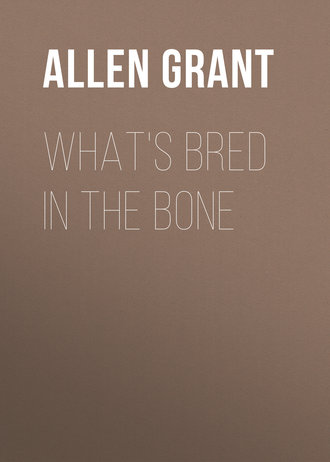 полная версия
полная версияWhat's Bred in the Bone
Just at that moment they were relieved from the temporary embarrassment which the mention of Sardanapalus seemed to have caused the party, by the approach of a tall and very handsome man, who came forward with a smile towards where their group was standing. He was military in bearing, and had dark brown hair, with a white moustache; but he hardly looked more than fifty for all that, as Guy judged at once from his erect carriage and the singular youthfulness of both face and figure. That he was a born aristocrat one could see in every motion of his well-built limbs. His mien had that ineffable air of grace and breeding which sometimes marks the members of our old English families. Very much like Cyril, too, Guy thought to himself, in a flash of intuition; very much like Cyril, the way he raised his hat and then smiled urbanely on Mrs. Clifford and Elma. But it was Cyril grown old and prematurely white, and filled full with the grave haughtiness of an honoured aristocrat.
"Why, here's Colonel Kelmscott!" Mrs. Clifford exclaimed, with a sigh of relief, not a little set at ease by the timely diversion. "We're so glad you've come, Colonel. And Lady Emily too; she's over yonder, is she? Ah, well, I'll look out for her. We heard you were to be here. Oh, how kind of you; thank you. No, Elma's none the worse for her adventure, thank Heaven! just a little shaken, that's all, but not otherwise injured. And this gentleman's the brother of the kind friend who was so good to her in the tunnel. I'm not quite sure of the name. I think it's–"
"Guy Waring," the young man interposed blandly. Hardly any one who looked at Colonel Kelmscott's eyes could even have perceived the profound surprise this announcement caused him. He bowed without moving a muscle of that military face. Guy himself never noticed the intense emotion the introduction aroused in the distinguished stranger. But Mrs. Clifford and Elma, each scanning him closely with those keen grey eyes of theirs, observed at once that, unmoved as he appeared, a thunderbolt falling at Colonel Kelmscott's feet could not more thoroughly or completely have stunned him. For a second or two he gazed in the young man's face uneasily, his colour came and went, his bosom heaved in silence; then he roped his moustache with his trembling fingers, and tried in vain to pump up some harmless remark appropriate to the occasion. But no remark came to him. Mrs. Clifford darted a furtive glance at Elma, and Elma darted back a furtive glance at Mrs. Clifford. Neither said a word, and each let her eyes drop to the ground at once as they met the other's. But each knew in her heart that something passing strange had astonished Colonel Kelmscott; and each knew, too, that the other had observed it.
Mother and daughter, indeed, needed no spoken words to tell these things plainly to one another. The deep intuition that descended to both was enough to put them in sympathy at once without the need of articulate language.
"Yes, Mr. Guy Waring," Mrs. Clifford repeated at last, breaking the awkward silence that supervened upon the group. "The brother of Mr. Cyril Waring, who was so kind the other day to my daughter in the tunnel."
The Colonel started imperceptibly to the naked eye again.
"Oh, indeed," he said, forcing himself with an effort to speak at last. "I've read about it, of course; it was in all the papers…. And—eh—is your brother here, too, this afternoon, Mr. Waring?"
CHAPTER VII.
KELMSCOTT OF TILGATE
To both Elma and her mother this meeting between Colonel Kelmscott and Guy Waring was full of mystery. For the Kelmscotts, of Tilgate Park, were the oldest county family in all that part of Surrey; and Colonel Kelmscott himself passed as the proudest man of that haughtiest house in Southern England. What, therefore, could have made him give so curious and almost imperceptible a start the moment Guy Waring's name was mentioned in conversation? Not a word that he said, to be sure, implied to Guy himself the depth of his surprise; but Elma, with her marvellous insight, could see at once, for all that, by the very haze in his eyes, that he was fascinated by Guy's personality, somewhat as she herself had been fascinated the other day in the train by Sardanapalus. Nay, more; he seemed to wish, with all his heart, to leave the young man's presence, and yet to be glued to the spot, in spite of himself, by some strange compulsion.
It was with a dreamy, far-away tone in his voice that the Colonel uttered those seemingly simple words, "And is your brother here, too, this afternoon, Mr. Waring?"
"Yes, he's somewhere about," Guy answered carelessly. "He'll turn up by-and-by, no doubt. He's pretty sure to find out, sooner or later, Miss Clifford's here, and then he'll come round this way to speak to her."
For some time they stood talking in a little group by the bench, Colonel Kelmscott meanwhile thawing by degrees and growing gradually interested in what Guy had to say, while Elma looked on with a devouring curiosity.
"Your brother's a painter, you say," the Colonel murmured once under that heavy white moustache of his; "yes, I think I remember. A rising painter. Had a capital landscape in the Grosvenor last year, I recollect, and another in the Academy this spring, if I don't mistake—skied—skied, unfairly; yet a very pretty thing, too; 'At the Home of the Curlews.'"
"He's painting a sweet one now," Elma put in quickly, "down here, close by, in Chetwood Forest. He told me about it; it must be simply lovely—all fern and mosses, with, oh! such a beautiful big snake in the foreground."
"I should like to see it," Colonel Kelmscott said slowly, not without a pang. "If it's painted in the forest—and by your brother, Mr. Waring—that would give it, to me, a certain personal value." He paused a moment; then he added, in a little explanatory undertone, "I'm lord of the manor, you know, at Chetwood; and I shoot the forest."
"Cyril would be delighted to let you see the piece when it's finished," Guy answered lightly. "If you're ever up in town our way—we've rooms in Staple Inn. I dare say you know it—that quaint, old-fashioned looking place, with big lattice windows, that overhangs Holborn."
Colonel Kelmscott started, and drew himself up still taller and stiffer than before.
"I may have some opportunity of seeing it some day in one of the galleries," he answered coldly, as if not to commit himself. "To tell you the truth, I seldom have time to lounge about in studios. It was merely the coincidence of the picture being painted in Chetwood Forest that made me fancy for a moment I might like to see it. But I'm no connoisseur. Mrs. Clifford, may I take you to get a cup of tea? Tea, I think, is laid out in the tent behind the shrubbery."
It was said in a tone to dismiss Guy politely; and Guy, taking the hint, accepted it as such, and fell back a pace or two to his garrulous old lady. But before Colonel Kelmscott could walk off Mrs. Clifford and her daughter to the marquee for refreshments, Elma gave a sudden start, and blushed faintly pink through that olive-brown skin of hers.
"Why, there's MY Mr. Waring!" she exclaimed, in a very pleased tone, holding out her hand, with a delicious smile; and as she said it, Cyril and Montague Nevitt strolled up from behind a great clump of lilacs beside them.
Two pairs of eyes watched those young folks closely as they shook hands once more—Guy's and Mrs. Clifford's. Guy observed that a little red spot rose on Cyril's cheek he had rarely seen there, and that his voice trembled slightly as he said, "How do you do?" to his pretty fellow-traveller of the famous adventure. Mrs. Clifford observed that the faint pink faded out of the olive-brown skin as Elma took Cyril Waring's hand in hers, and that her face grew pale for three minutes afterwards. And Colonel Kelmscott, looking on with a quietly observant eye, remarked to himself that Cyril Waring was a very creditable young man indeed, as handsome as Guy, and as like as two peas, but if anything perhaps even a trifle more pleasing.
For the rest of that afternoon, they six kept constantly together.
Elma noted that Colonel Kelmscott was evidently ill at ease; a thing most unusual with that proud, self-reliant aristocrat. He held himself, to be sure, as straight and erect as ever, and moved about the grounds with that same haughty air of perfect supremacy, as of one who was monarch of all he surveyed in the county of Surrey. But Elma could see, for all that, that he was absent-minded and self-contained; he answered all questions in a distant, unthinking way; some inner trouble was undoubtedly consuming him. His eyes were all for the two Warings. They glanced nervously right and left every minute in haste, but returned after each excursion straight to Guy and Cyril. The Colonel noted narrowly all they said and did; and Elma was sure he was very much pleased at least with her painter. How could he fail to be, indeed?—for Mr. Waring was charming. Elma wished she could have strolled off with him about the lawn alone, were it only ten paces in front of her mother. But somehow the fates that day were unpropitious. The party held together as by some magnetic bond, and Mrs. Clifford's eye never for one moment deserted her.
The Colonel glowered. The Colonel was moody. His speech was curt. He occupied himself mainly in listening to Guy and Cyril. A sort of mesmeric influence seemed to draw him towards the two young men.
He drew them out deliberately. Yet the start he had given as either young man came up towards his side was a start, not of mere neutral surprise, but of positive disinclination and regret at the meeting. Nay, even now he was angling hard, with all the skill of a strategist, to keep the Warings out of Lady Emily's way. But the more he talked to them, the more interested he seemed. It was clear he meant to make the most of this passing chance—and never again, if he could help it, Elma felt certain, to see them.
Once, and once only, Granville Kelmscott, his son, strolled casually up and joined the group by pure chance for a few short minutes. The heir of Tilgate Park was tall and handsome, though less so than his father; and Mrs. Clifford was not wholly indisposed to throw him and Elma together as much as possible. Younger by a full year than the two Warings, Granville Kelmscott was not wholly unlike them in face and manner. As a rule, his father was proud of him, with a passing great pride, as he was proud of every other Kelmscott possession. But to-day, Elma's keen eye observed that the Colonel's glance moved quickly in a rapid dart from Cyril and Guy to his son Granville, and back again from his son Granville to Guy and Cyril. What was odder still, the hasty comparison seemed to redound not altogether to Granville's credit. The Colonel paused, and stifled a sigh as he looked; then, in spite of Mrs. Clifford's profound attempts to retain the heir by her side, he sent the young man off at a moment's notice to hunt up Lady Emily. Now why on earth did he want to keep Granville and the Warings apart? Mrs. Clifford and Elina racked their brains in vain; they could make nothing of the mystery.
It was a long afternoon, and Elma enjoyed it, though she never got her tete-a-tete after all with Cyril Waring. Just a rapid look, a dart from the eyes, a faint pressure of her hand at parting—that was all the romance she was able to extract from it, so closely did Mrs. Clifford play her part as chaperon. But as the two young men and Montague Nevitt hurried off at last to catch their train back to town, the Colonel turned to Mrs. Clifford with a sigh of relief.
"Splendid young fellows, those," he exclaimed, looking after them. "I'm not sorry I met them. Ought to have gone into a cavalry regiment early in life; what fine leaders they'd have made, to be sure, in a dash for the guns or a charge against a battery! But they seem to have done well for themselves in their own way: carved out their own fortunes, each after his fashion. Very plucky young fellows. One of them's a painter, and one's a journalist; and both of them are making their mark in their own world. I really admire them."
And on the way to the station, that moment, Mr. Montague Nevitt, as he lit his cigarette, was saying to Cyril, with an approving smile, "Your Miss Clifford's pretty."
"Yes," Cyril answered drily, "she's not bad looking. She looked her best to-day. And she's capital company."
But Guy broke out unabashed into a sudden burst of speech.
"Not bad looking!" he cried contemptuously. "Is that all you have to say of her? And you a painter, too! Why, she's beautiful! She's charming! If Cyril was shut up in a tunnel with HER–"
He broke off suddenly.
And for the rest of the way home he spoke but seldom. It was all too true. The two Warings were cast in the self-same mould. What attracted one, it was clear, no less surely and certainly attracted the other.
As they went to their separate rooms in Staple Inn that night, Guy paused for a moment, candle in hand, by his door, and looked straight at Cyril.
"You needn't fear ME," he said, in a very low tone. "She's yours. You found her. I wouldn't be mean enough for a minute to interfere with your find. But I'm not surprised at you. I would do the same myself, if I could have seen her first. I won't see her again. I couldn't stand it. She's too beautiful to see and not to fall in love with."
CHAPTER VIII.
ELMA BREAKS OUT
Mrs. Clifford returned from Chetwood Court that clay in by no means such high spirits as when she went there. In the first place, she hadn't succeeded in throwing Elma and Granville Kelmscott into one another's company at all, and in the second place Elma had talked much under her very nose, for half-an-hour at a stretch, with the unknown young painter fellow. When Elma was asked out anywhere else in the country for the next six weeks or so, Mrs. Clifford made up her mind strictly to inquire in private, before committing herself to an acceptance, whether that dangerous young man was likely or not to be included in the party.
For Mrs. Clifford admitted frankly to herself that Cyril was dangerous; as dangerous as they make them. He was just the right age; he was handsome, he was clever, his tawny brown beard had the faintest little touch of artistic redness, and was trimmed and dressed with provoking nicety. He was an artist too; and girls nowadays, you know, have such an unaccountable way of falling in love with men who can paint, or write verses, or play the violin, or do something foolish of that sort, instead of sticking fast to the solid attractions of the London Stock Exchange or of ancestral acres.
Mrs. Clifford confided her fears that very night to the sympathetic ear of the Companion of the Militant and Guardian Saints of the British Empire.
"Reginald," she said solemnly, "I told you the other day, when you asked about it, Elma wasn't in love. And at the time I was right, or very near it. But this afternoon I've had an opportunity of watching them both together, and I've half changed my mind. Elma thinks a great deal too much altogether, I'm afraid, about this young Mr. Waring."
"How do you know?" Mr. Clifford asked, staring her hard in the face, and nodding solemnly.
The British matron hesitated. "How do I know anything?" she answered at last, driven to bay by the question. "I never know how. I only know I know it. But whatever we do we must be careful not to let Elma and the young man get thrown together again. I should say myself it wouldn't be a bad plan if we were to send her away somewhere for the rest of the summer, but I can tell you better about all this to-morrow."
Elma, for her part, had come home from Chetwood Court more full than ever of Cyril Waring. He looked so handsome and so manly that afternoon at the Holkers'. Elma hoped she'd be asked out where he was going to be again.
She sat long in her own bedroom, thinking it over with herself, while the candle burnt down in its socket very low, and the house was still, and the rain pattered hard on the roof overhead, and her father and mother were discussing her by themselves downstairs in the drawing-room.
She sat long on her chair without caring to begin undressing. She sat and mused with her hands crossed on her lap. She sat and thought, and her thoughts were all about Cyril Waring.
For more than an hour she sat there dreamily, and told herself over, one by one, in long order, the afternoon's events from beginning to the end of them. She repeated every word Cyril had spoken in her ear. She remembered every glance, every look he had darted at her. She thought of that faint pressure of his hand as he said farewell. The tender blush came back to her brown cheek once more with maidenly shame as she told it all over. He was so handsome and so nice, and so very, very kind, and, perhaps, after this, she might never again meet him. Her bosom heaved. She was conscious of a new sense just aroused within her.
Presently her heart began to beat more violently. She didn't know why. It had never beaten in her life like that before—not even in the tunnel, nor yet when Cyril came up to-day and spoke first to her. Slowly, slowly, she rose from her seat. The fit was upon her. Could this be a dream? Some strange impulse made her glide forward and stand for a minute or two irresolute, in the middle of the room. Then she turned round, once, twice, thrice, half unconsciously. She turned round, wondering to herself all the while what this strange thing could mean; faster, faster, faster, her heart within her beating at each turn with more frantic haste and speed than ever. For some minutes she turned, glowing with red shame, yet unable to stop, and still more unable to say to herself why or wherefore.
At first that was all. She merely turned and panted. But as she whirled and whirled, new moods and figures seemed to force themselves upon her. She lifted her hands and swayed them about above her head gracefully. She was posturing she knew, but why she had no idea. It all came upon her as suddenly and as uncontrollably as a blush. She was whirling around the room, now slow, now fast, but always with her arms held out lissom, like a dancing-girl's. Sometimes her body bent this way, and sometimes that, her hands keeping time to her movements meanwhile in long graceful curves, but all as if compelled by some extrinsic necessity.
It was an instinct within her over which she had no control. Surely, surely, she must be possessed. A spirit that was not her seemed to be catching her round the waist, and twisting her about, and making her spin headlong over the floor through this wild fierce dance. It was terrible, terrible. Yet she could not prevent it. A force not her own seemed to sustain and impel her.
And all the time, as she whirled, she was conscious also of some strange dim need. A sense of discomfort oppressed her arms. She hadn't everything she required for this solitary orgy. Something more was lacking her. Something essential, vital. But what on earth it could be she knew not; she knew not.
By-and-by she paused, and, as she glanced right and left, the sense of discomfort grew clearer and more vivid. It was her hands that were wrong. Her hands were empty. She must have something to fill them. Something alive, lithe, curling, sinuous. These wavings and swayings, to this side and to that, seemed so meaningless and void—without some life to guide them. There was nothing for her to hold; nothing to tame and subdue; nothing to cling and writhe and give point to her movements. Oh! heavens, how horrible!
She drew herself up suddenly, and by dint of a fierce brief effort of will repressed for awhile the mad dance that overmastered her. The spirit within her, if spirit it were, kept quiet for a moment, awed and subdued by her proud determination. Then it began once more and led her resistlessly forward. She moved over to the chest of drawers still rhythmically and with set steps, but to the phantom strain of some unheard low music. The music was running vaguely through her head all the time—wild Aeolian music—it sounded like a rude tune on a harp or zither. And surely the cymbals clashed now and again overhead; and the timbrel rang clear; and the castanets tinkled, keeping time with the measure. She stood still and listened. No, no, not a sound save the rain on the roof. It was the music of her own heart, beating irregularly and fiercely to an intermittent lilt, like a Hungarian waltz or a Roumanian tarantella.
By this time, Elina was thoroughly frightened. Was she going mad? she asked herself, or had some evil spirit taken up his abode within her? What made her spin and twirl about like this—irresponsibly, unintentionally, irrepressibly, meaninglessly? Oh, what would her mother say, if only she knew all? And what on earth would Cyril Waring think of her?
Cyril Waring! Cyril Waring! It was all Cyril Waring. And yet, if he knew—oh, mercy, mercy!
Still, in spite of these doubts, misgivings, fears, she walked over towards the chest of drawers with a firm and rhythmical tread, to the bars of the internal music that rang loud through her brain, and began opening one drawer after another in an aimless fashion. She was looking for something—she didn't know what; and she never could rest now until she'd found it.
Drawer upon drawer she opened and shut wearily, but nothing that her eyes fell upon seemed to suit her mood. Dresses and jackets and underlinen were there; she glanced at them all with a deep sense of profound contempt; none of these gewgaws of civilized life could be of any use to supply the vague want her soul felt so dimly and yet so acutely. They were dead, dead, dead, so close and clinging! Go further! Go further! At last she opened the bottom drawer of all, and her eye fell askance upon a feather boa, curled up at the bottom—soft, smooth, and long; a winding, coiling, serpentine boa. In a second, she had fallen upon it bodily with greedy hands, and was twisting it round her waist, and holding it high and low, and fighting fiercely at times, and figuring with it like a posturant. Some dormant impulse of her race seemed to stir in her blood, with frantic leaps and bounds, at its first conscious awakening. She gave herself up to it wildly now. She was mad. She was mad. She was glad. She was happy.
Then she began to turn round again, slowly, slowly, slowly. As she turned, she raised the boa now high above her head; now held it low on one side, now stooped down and caressed it. At times, as she played with it, the lifeless thing seemed to glide from her grasp in curling folds and elude her; at others, she caught it round the neck like a snake, and twisted it about her arm, or let it twine and encircle her writhing body. Like a snake! like a snake! That idea ran like wildfire through her burning veins. It was a snake, indeed, she wanted; a real live snake; what would she not have given, if it were only Sardanapalus!
Sardanapalus, so glossy, so beautiful, so supple, that glorious green serpent, with his large smooth coils, and his silvery scales, and his darting red tongue, and his long lithe movements. Sardanapalus, Sardanapalus, Sardanapalus! The very name seemed to link itself with the music in her head. It coursed with her blood. It rang through her brain. And another as well. Cyril Waring, Cyril Waring, Cyril Waring, Cyril Waring! Oh! great heavens, what would Cyril Waring say now, if only he could see her in her mad mood that moment!
And yet it was not she, not she, not she, but some spirit, some weird, some unseen power within her. It was no more she than that boa there was a snake. A real live snake. Oh, for a real live snake! And then she could dance—tarantel, tarantella—as the spirit within her prompted her to dance it.
"Faster, faster," said the spirit; and she answered him back, "Faster!"
Faster, faster, faster, faster she whirled round the room; the boa grew alive; it coiled about her; it strangled her. Her candle failed; the wick in the socket flickered and died; but Elma danced on, unheeding, in the darkness. Dance, dance, dance, dance; never mind for the light! Oh! what madness was this? What insanity had come over her? Would her feet never stop? Must she go on till she dropped? Must she go on for ever?
Ashamed and terrified with her maidenly sense, overawed and obscured by this hateful charm, yet unable to stay herself, unable to resist it, in a transport of fear and remorse, she danced on irresponsibly. Check herself she couldn't, let her do what she would. Her whole being seemed to go forth into that weird, wild dance. She trembled and shook. She stood aghast at her own shame. She had hard work to restrain herself from crying aloud in her horror.









